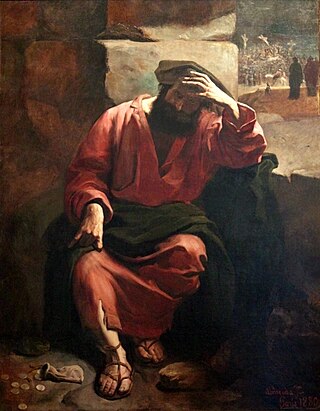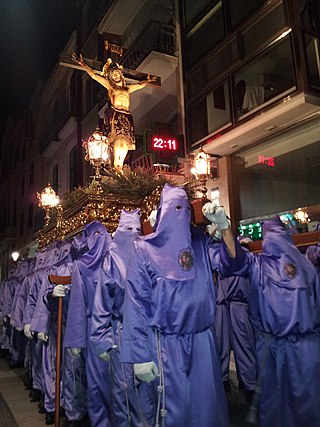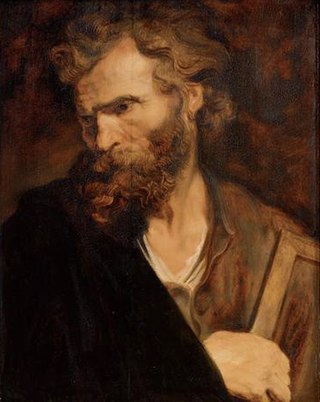Judah or Yehuda is the name of a biblical patriarch, Judah. It may also refer to:
Judas Iscariot was the apostle of Jesus who betrayed him.

Judas Iscariot was—according to Christianity's four canonical gospels—a first-century Jewish man who became a disciple and one of the original Twelve Apostles of Jesus Christ. Judas betrayed Jesus to the Sanhedrin in the Garden of Gethsemane by kissing him on the cheek and addressing him as "master" to reveal his identity in the darkness to the crowd who had come to arrest him in exchange for 30 pieces of silver. Like Brutus, his name is often used synonymously with betrayal or treason.

Jude was one of the Twelve Apostles of Jesus according to the New Testament. He is generally identified as Thaddeus and is also variously called Judas Thaddaeus, Jude Thaddaeus, Jude of James, or Lebbaeus. He is sometimes identified with Jude, the brother of Jesus, but is clearly distinguished from Judas Iscariot, the disciple who betrayed Jesus prior to his crucifixion. Catholic writer Michal Hunt suggests that Judas Thaddaeus became known as Jude after early translators of the New Testament from Greek into English sought to distinguish him from Judas Iscariot and subsequently abbreviated his forename. Most versions of the New Testament in languages other than English and French refer to Judas and Jude by the same name.

In Christianity, Holy Wednesday commemorates the Bargain of Judas as a clandestine spy among the disciples. It is also called Spy Wednesday, or Good Wednesday, and Great and Holy Wednesday.

The Gospel of Judas is a non-canonical Gnostic gospel. The content consists of conversations between Jesus and Judas Iscariot. Given that it includes late 2nd-century theology, it is widely thought to have been composed in the 2nd century by Gnostic Christians. The only copy of it known to exist is a Coptic language text that has been carbon dated to 280 AD, plus or minus 60 years. It has been suggested that the text derives from an earlier manuscript in the Greek language. An English translation was first published in early 2006 by the National Geographic Society.

The burning of Judas is an Easter-time ritual that originated in European Christian communities where an effigy of Judas Iscariot is burned. Other related mistreatment of Judas effigies include hanging, flogging, and exploding with fireworks. A similar ritual in Jewish tradition would be the hanging and burning an effigy of Haman and his ten sons during Purim, although this is not a widespread contemporary practice.
Judas Iscariot was an American black metal band. It began in 1992 as the solo-project of Andrew Harris, who performed under the pseudonym Akhenaten.
"The Way of Cross and Dragon" is a science fiction short story by American writer George R. R. Martin. It involves a far-future priest of the One True Interstellar Catholic Church of Earth and the Thousand Worlds investigating a sect that reveres Judas Iscariot. The story deals with the nature and limitations of religious faith.
Judas Tree is a common name for a flowering tree, Cercis siliquastrum from which Judas Iscariot is reputed to have hanged himself.

Matthew 26 is the 26th chapter of the Gospel of Matthew, part of the New Testament of the Christian Bible. This chapter covers the beginning of the Passion of Jesus narrative, which continues to Matthew 28; it contains the narratives of the Jewish leaders' plot to kill Jesus, Judas Iscariot's agreement to betray Jesus to Caiphas, the Last Supper with the Twelve Apostles and institution of the Eucharist, the Agony in the Garden of Gethsemane and the subsequent vindication of Jesus' predictions, of betrayal by one of the twelve Apostles, and that he will, in the Denial of Peter, be disowned by his closest follower, Saint Peter.

Hellsing is a Japanese manga series written and illustrated by Kouta Hirano. It was serialized in Shōnen Gahōsha's seinen manga magazine Young King OURs from April 1997 to September 2008, with its chapters collected in ten tankōbon volumes. The series chronicles the efforts of the mysterious and secret Hellsing Organization as it combats vampires, ghouls, and other supernatural foes who threaten England. The series was licensed for English language release in North America by Dark Horse Comics. From 2002 to 2006, Hirano released a six-chapter prequel series, Hellsing: The Dawn, in Young King OURs Zōkan.

The Last Days of Judas Iscariot is a play by American playwright Stephen Adly Guirgis first staged Off-Broadway at The Public Theater on March 2, 2005, directed by Philip Seymour Hoffman.
Hanging of Judas may refer to:

The Bargain of Judas is a biblical episode related to the life of Jesus which is recorded in all three Synoptic Gospels, Matthew 26:14–16, Mark 14:10–11 and Luke 22:1–6. It relates how Judas Iscariot made a bargain with the Jewish chief priests to betray Jesus.

Jesus predicts his betrayal three times in the New Testament, a narrative which is included in all four Canonical Gospels. This prediction takes place during the Last Supper in Matthew 26:24–25, Mark 14:18–21, Luke 22:21–23, and John 13:21–30.

The names Judas and Jude, both derived from the Greek Ἰούδας (Ioúdas), itself derived from the Hebrew name Judah together appear 36 times in the New Testament. Judas was a very common given name in the historical period and region of Jesus, due to the renowned hero Judas Maccabeus. As surnames were still very rare, it is therefore not always clear which person these names refer to, and whether some refer to the same person or distinct characters, which has led to confusion. Therefore, Christian authors and modern scholars have given these men names based on their known attributes. 'Judas' is sometimes rendered as 'Jude' in English in order to help distinguish some of the people named Ἰούδας in the New Testament, even though the original Greek texts make no such distinction.
Judas the Apostle my refer to:
This page is based on this
Wikipedia article Text is available under the
CC BY-SA 4.0 license; additional terms may apply.
Images, videos and audio are available under their respective licenses.










